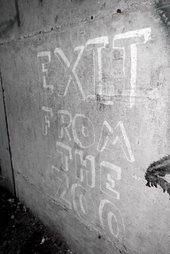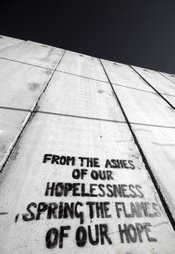“As soon as [language] functions it offends or reconciles, attracts or repels, breaks, dissociates, unites or reunites; it cannot help but liberate and enslave.”
~Michel Foucault
The very notion of a solution suggests, necessitates the reality of some kind of disruption. A peace process entails a correspondent rupture of peace—war, violence, separation. Yet identifying the reality of some kind of violent disruption only acknowledges the negative lack of peace; it does not, by itself, get to the complexity of positively identifying exactly what kind of violent disruption is taking place. Acknowledging that Israelis and Palestinians are in “conflict” is necessary for understanding the need for peace; its usefulness ends there. Getting beyond the acknowledgment of violent disruption to the source of the conflict demands that one do the complex and controversial work of deconstructing the mythologies, stereotypes, and misinformation that so often characterize the many existing narratives concerning the Israeli-Palestinian conflict. This process of deconstruction is important because it is the only way to illuminate a potential for peace. Like a virus, violent conflict cannot be properly treated until it is accurately diagnosed.
There exists a body of terminology used in popular media and conversation to describe the historical and contemporary situation here in Israel and Palestine. Perhaps the most common term is “conflict”—the “Palestinian-Israeli conflict.” Other increasingly common and more useful terms include: “occupation,” “defense,” “apartheid,” “security,” “Al-Nakba” (the catastrophe), “ethnic cleansing” and “intifada” (uprising). What I mean when I say that these terms are more useful is that they, by nature of their particularity, break through the simplistic crust, the painfully obvious reality that there is a lack of peace—conflict—and begin the complex task of classifying the conflict. Seeking such linguistic particularities is important for its ability to focus and disrupt.
They focus because they differentiate between parties, suggesting a victim and a victimizer. An oppressor and an oppressed. They serve up blame in unequal portions, thus avoiding the farce of neutrality. In thinking about peace there is no room for neutrality…objectivity for sure but not neutrality. It is indeed a difficult and touchy matter to attempt to identify which side is more to blame when faced with the tragedy of death on both sides but it is nevertheless a process indispensable to thinking about how to rectify injustice and achieve sustainable peace. One must place conflicting sides on the scales of justice and weigh one against the other. To distort or ignore the prescriptions of justice is to be complicit in the injustice being weighed.
The point here is not to demonize one side or ignore either side’s violence but rather to strip away the distorting myth that the conflict is too complex to identify a victim and a victimizer. That is not to say that those roles do not flex and periodically swap but rather to focus the terminology enough to have some sense of the fleshy reality beneath the stagnant shell of neutrality.
Linguistic particularities like “defense” and “apartheid” disrupt insofar as they bring nuance and disorder into the vague, colorless sea of generalities and presumption. For instance, the moment one applies the term “apartheid” to the situation in the occupied Palestinian territories they disrupt and confuse vague stereotypes about the conflict like “all Arabs are Jew-hating terrorists” or “Israel is doing what she is doing in the West Bank and Gaza in order to protect her citizens.” Whether one agrees or disagrees objectively with the application of the term “apartheid” to the Israel’s actions in the West Bank and Gaza it, at least, interjects badly needed disorder into the stale order of simply calling the situation a “conflict,” forcing one to support the accusation or refute it. And thus nuance and complexity is created where there was once only presumption; that is assuming one thoroughly supports or refutes the accusation of apartheid.
In order to apply some of this jumbled abstraction I would like to open a discussion here. The questions: Exactly what kind of “conflict” are we dealing with here in Israel and Palestine? Is it useful or possible to identify a victim and a victimizer? What exactly is the extent and kind of power imbalance between the Palestinians and Israelis? What implications does this power imbalance posit into the possibility for peace? How can we be faithful to the reality and scope of suffering in both societies and yet maintain a rigid devotion to confronting the facts head on and considering their implications without fear of coming off as biased? To preface the discussion I would like to introduce the topic within the framework of three of the terms mentioned above: “defense,” “occupation” and “apartheid.” Specifically I am interested in exploring distinctions between the three terms as they apply to the Israeli military force that controls the West Bank and the Gaza Strip.
Before I came to Israel and Palestine this summer I referred to the Israeli military force in the West Bank the same way the media and Israel herself does: the “IDF”—Israeli Defense Force. Yet soon after arriving in the West Bank I began to hear the term “IOF” used often—“Israeli Occupation Force,” a snide suggestion that Israel’s military presence in the West Bank and her control over Gaza may in fact have nothing to do with “defense.” And as the trip has gone on I have increasingly began referring to the Israeli military as the “IAF”—Israeli Apartheid Force. My bias is readily apparent, I know.
The “IDF” (Israeli Defense Force) is the most commonly used term to refer to the Israeli forces in the occupied Palestinian territories. The underlying suggestion is that the Israeli people are victims of Palestinian terrorism. Thus the occupation of the West Bank and Gaza is an occupation of necessity. An occupation arising out of a situation of terror so extreme that it necessitates that Israel occupy its Palestinian neighbor in order to defend its citizens. Furthermore, it insinuates that there exists a Palestinian force powerful enough to threaten the existence of Israel.
The “IOF” (Israeli Occupation Force) is a taboo reference to the Israeli forces in the West Bank and formerly in Gaza simply as occupiers. It is important to understand that no one or no existing terminology denies the reality of occupation. Rather the term “IOF” accentuates occupation as the driving incentive. Its novelty is in its dismissal of defense as a legitimate basis for occupation.
The term “IAF” (Israeli Apartheid Force) goes beyond dismissing defense and acknowledging occupation suggesting an active Israeli campaign of separation of peoples within the West Bank in order to annex land and systematically control natural resources, effectively making life in the West Bank and Gaza, outside of isolated cantons, unlivable. In addition to suggesting a more active, malevolent Israeli role in the occupied territories, it vividly identifies with the historical apartheid in South Africa. Its connection to apartheid in South Africa is meant to create an automatic and strong aversion to Israeli control over the West Bank and Gaza.
What do you think? Which term seems most fitting? What are further questions you might have about the situation? Thus far we have been conveying our thoughts and experiences to you, yet now we would like to hear what you all think, to invite you to become involved in our learning process and to engage this important issue.


5 comments:
muchas gracias para poner las cosas claras. estoy de acuerdo contigo en la eleccion de palabras para las fuerzas armadas de israel. siempre tengo mas preguntas! justo ahora me voy a la iglesia. paz sea contigo y con el pueblo.
*gracias por*
So it seems that “IDF” means more combined “IOF” and “IAF” , than the so called "Defence" mission, and that's pitty.
I mean this is the general biggest problem of the whole world. There's always something more and different reason (even a simple one) of starting war among nations, more exactly, among governments who are the victimizers and the rest people only victims.
This is the same situation with Palestine and Israel, i guess.
It's clear from your posts that Palestines take no offence on Isralians. They just need peace and justice.
But interesting, what does Israelian common people think about the situation?
Have you conducted this?
The problem with labels is that they do not accurately portray the complexity of a reality. As you so aptly pointed out in the term "conflict", so I believe it is in the case in which term to use for the relationship Israel’s military presence in Palestine plays (i.e., IDF, IOF, or IAF). I believe each serves a purpose of portraying some peoples' perspectives on the situation. Perhaps one term does not capture the complexity of what is actually occurring for every individual as well as the collective experience of a people group. Like in Northern Ireland, I am an advocate for "arguing for complexity."
What is the point in pointing fingers at one "side" or the other being the most responsible? Who is the judge and jury? What will it accomplish if apartheid is not dealt w/ by amnesty? You used South Africa as an example. From living there and my study, I believe they have set an example for the world to follow in open and honest dialogue that bears witness to the power of forgiveness in peace and reconciliation. I believe the only thing that can conquer hate is love, and you cannot have love without forgiveness.
Post a Comment